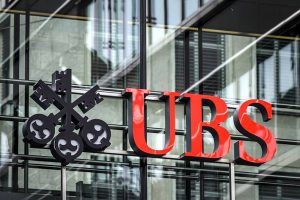BLOOMBERG
Additional Tier 1 (AT1) bonds issued by lenders from UBS Group AG to Kookmin Bank in South Korea are rising as regulators’ assurances helped boost confidence and Goldman Sachs Group Inc analysts highlighted opportunities in the notes.
UBS’s $1.5 billion 4.375% perpetual notes were among the biggest gainers in Europe on Wednesday, having risen around 2 points to 66.31 in London, according to data compiled by Bloomberg. Deals from other European lenders including UniCredit SpA, Deutsche Bank AG and ING Groep NV rose in line with the UBS notes, according to pricing source CBBT.
Of 38 dollar-denominated perpetual bonds assessed that were trading in Asia, 29 advanced while the rest were quoted lower, according to data compiled by Bloomberg. Bank of Communications Co’s perpetual note rose as much as 1.6 cents to around 95.7, its biggest gain since March 2020. Kookmin Bank’s US currency debt rose as much as 1.2 cents to 94.5.
The bounce in AT1s corresponded with broader positive sentiment in the markets, with US equity futures steady and European stocks edging higher ahead of the Federal Reserve’s policy decision. “We’ll have to see if this is maintained, and there’ve certainly been false dawns before,†said Deutsche Bank strategists including Jim Reid.
The bonds designed to help banks meet regulatory capital requirements are rebounding from losses at the start of the week, when a state-led rescue plan for Credit Suisse Group AG wiped out its AT1 note holders. That spooked investors in the broader market, although assurances from authorities in the UK and the European Union helped reverse the selloff.
Some AT1 securities from the strongest banks in Asia Pacific offer attractive investment opportunities with their yields already exceeding their cost of equity, according to Goldman Sachs credit analysts Kenneth Ho and Chakki Ting.
“Investors should focus on the bigger, stronger banks, as they have lower risk of entering into stress events, and could be systemically important,†they wrote. “We see the recent weakness as an opportunity to add risk in their AT1 securities.â€
 The Gulf Time Newspaper One of the finest business newspapers in the UAE brought to you by our professional writers and editors.
The Gulf Time Newspaper One of the finest business newspapers in the UAE brought to you by our professional writers and editors.
